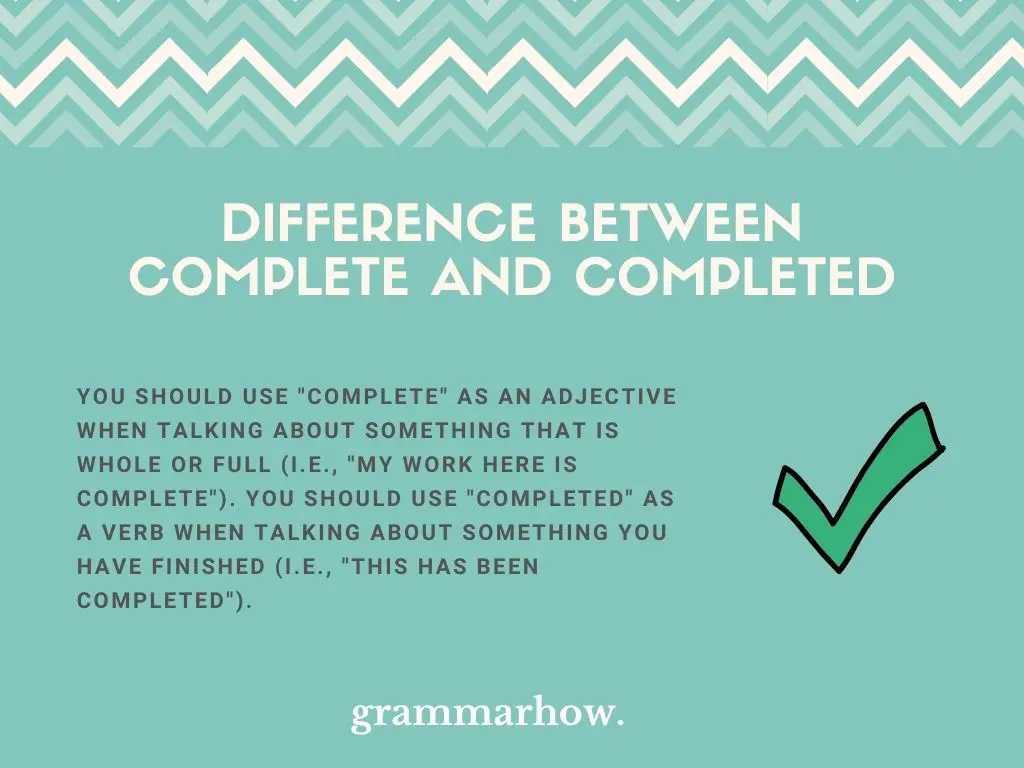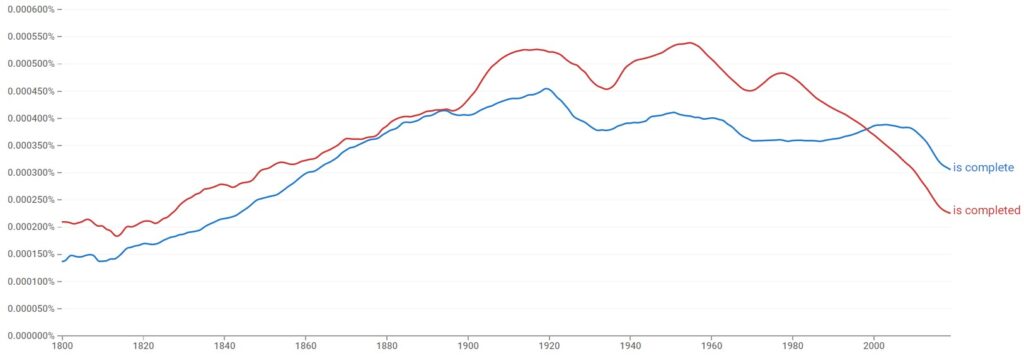When using the word “complete,” we’re able to use it as a verb or an adjective. Depending on how we use it, the spelling changes between “complete” and “completed.” This article will look at the difference and how to use them.”
What Is The Difference Between Complete And Completed?
You should use “complete” as an adjective when talking about something that is whole or full (i.e., “my work here is complete”). You should use “completed” as a verb when talking about something you have finished (i.e., “this has been completed”).

The definition of “complete” as an adjective, according to The Cambridge Dictionary, is “containing all the parts or pieces; whole.”
The definition of “completed” as a verb, according to The Cambridge Dictionary, is “to make whole or perfect.”
Is It “Is Complete” Or “Is Completed”?
It might help you to see a visualization of the two phrases to see which is more common. You’ll be surprised to learn that they’re almost identical in common usage across the board in English.
According to this graph, both “is complete” and “is completed” are correct. They’re about as popular as each other, though “is complete” is slightly more popular.

“Is complete” is most likely more popular because it uses “is” and “complete” as an adjective to describe something. For example:
- The job is complete.
Here, the noun “job” is modified by “complete” because it’s an adjective.
We might use “is completed,” but it uses the verb form, which doesn’t modify the noun in the same way, which is why it’s slightly less popular:
- The job is completed.
While this still works, it doesn’t hold the same finality that “is complete” does, and the adjective description is missing.
Examples Of How To Use “Complete” In A Sentence
Let’s go over some examples of using the two words. We’ll start with “complete” in the adjective form. We might use it in this way to describe a common noun or another word.
- The job is complete, and we don’t have to continue.
- This is complete, and I thank you for your time.
- You’re a complete mess! You know that, right?
- Mission complete! Well done, everyone!
- This is already complete; I don’t know what else you want me to do.
- I told you it was complete; please don’t ask for more.
- This is complete, so let’s move on.
“Complete” is an adjective used to modify a noun in the sentence. We use “is” or “was” before it when we do this, and it helps us to define what we’re talking about.
Examples Of How To Use “Completed” In A Sentence
“Completed” is the verb form, but it’s still relatively common to use. It’ll help you to see it written down so you understand when you might be able to use it for yourself.
- I told you, we’ve completed the task, and we’re ready for more.
- Have you completed what I asked of you?
- This has been completed already!
- We completed that, which is why it’s ticked off.
- I made sure that I completed these things before I left for my vacation.
- My work has been completed, so I can leave.
- Once completed, you should sign out, so we know not to contact you again.
“Completed” is a verb, allowing us to use an auxiliary before it like “have” to show that we’re writing in the present perfect tense. It works well when we’re taking the action of “finishing” a task.
Complete – Synonyms
We might also benefit from learning a few alternatives to “complete.” That way, if you’re struggling with the differences between the verb and adjective form, you can choose one of these to make your life easier.
- Finished
- Done
- Final
- Ended
- Concluded
- Finalized
- Accomplished
- Achieved
- Fulfilled
These synonyms work well to replace both “complete” and “completed” in a sentence. Most of them also come with the verb and adjective forms, making them completed replaceable.
Common Confusions About Complete Or Completed
If you’ve made mistakes before regarding “complete” and “completed,” you’re not alone. In fact, it’s remarkably common.
We’ll cover the common confusions you might come across when using “complete” and “completed” and explain what the correct version is and why.
Work Is Complete Or Completed?
“Work is complete” is correct when you want to describe work (a noun) as “complete” (an adjective). We rarely say “work is completed” because it doesn’t use the correct verb tenses.
- My work is complete, and I should go home.
Did You Complete Or Completed?
“Did you complete” is correct because it uses the past perfect tense to ask a question. We use the auxiliary verb “did,” which requires a present tense verb (“complete”) to work. “Did you completed” is never right for this reason.
- Did you complete the assignment I asked of you?
Mission Complete Or Completed?
“Mission complete” is correct because we’re modifying the noun (mission) to show that it is whole or finalized (complete). “Mission completed” achieves the same result, but it’s rarely used by native speakers.
- Mission complete! The beers are on me.
Once Complete Or Completed?
“Once completed” is correct because it refers to the action of “completing” a task. We have to finish it and then follow whatever orders come after “once completed.” “Once complete” is also correct but is less commonly seen.
- Once completed, I expect you to give me a full report.
- Once complete, make your way to the admin bay.
It Is Almost Complete Or Completed?
“It is almost complete” is correct because we use the adjective (complete) to modify the phrase and let the person know that we’re nearly finished with the project. “It is almost completed” is also correct, but it doesn’t work as well to convey the urgency of the task.
- It is almost complete, but I need more time.
- It is almost completed if you’ll allow me to finish.
Is Completed Or Has Completed?
“Has completed” is the correct verb tense to use and is the present perfect tense to talk about something that has been finished (“he has completed the task”). “Is completed” is wrong because we should use the adjective “complete” after “is” to modify the noun.
- He has completed the task you asked of him.
- This is complete.

Martin holds a Master’s degree in Finance and International Business. He has six years of experience in professional communication with clients, executives, and colleagues. Furthermore, he has teaching experience from Aarhus University. Martin has been featured as an expert in communication and teaching on Forbes and Shopify. Read more about Martin here.
